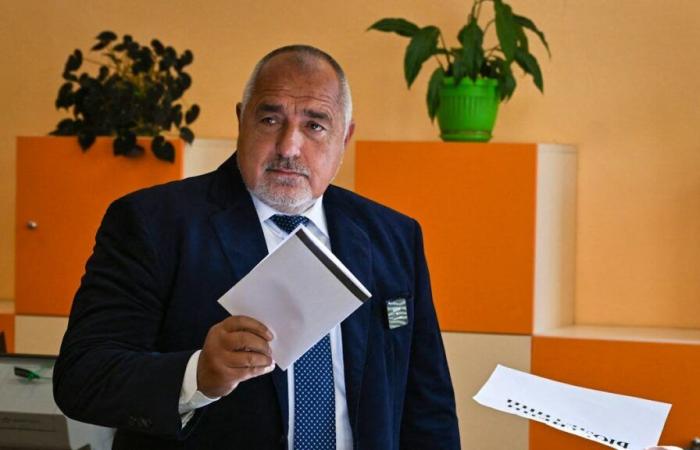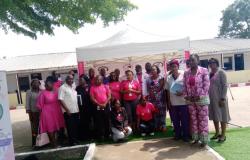Boyko Borissov casts his ballot at a polling station in Sofia during the Bulgarian legislative elections, October 27, 2024.
AFP
The conservatives led by former Prime Minister Boïko Borissov came first in the legislative elections on Sunday in Bulgaria, but uncertainty remains over the possible combinations to form a stable government, after seven elections in three and a half years. As in the last election in June, the Gerb party placed first with 26% of the votes ahead of the pro-European liberals of CC/BD (15%) and the pro-Russian nationalists of Vazrajdane (13%), according to exit polls. ballot boxes.
The ballots follow one another and are similar in the poorest country in the EU, where the breath of change against the conservatives of the summer of 2020, when Sofia was shaken by anti-corruption demonstrations, has completely subsided. “People want a government, stability, security,” Boyko Borissov declared while voting in the morning, reaching out to the rest of the political class. But here again he risks not finding allies to form a majority, in an extremely fragmented parliament, where seven to nine parties should be represented.
During the campaign, Kiril Petkov, a short-lived former liberal Prime Minister known for his “anti-corruption” fight, said he refused to associate himself with this political veteran with a tarnished image.
“Fed up”
The only consolation is that the participation rate increased slightly, standing at 35% one hour before the polling stations closed. Five months ago, only 34% of voters went to the polls, the lowest level since the fall of communism thirty-five years ago.
“We are fed up, that’s for sure,” Aneliya Ivanova testified before the vote in the streets of Sofia, the capital. “We are tired of being stuck in this merry-go-round that goes round and round, with always the same result at the end,” added this 33-year-old computer scientist, echoing opinion polls showing that more than 60% of Bulgarians judge the situation “extremely worrying”.
With this unprecedented political crisis since 1989, the Vazrajdane (Renaissance) party has established itself permanently in the political landscape. “Bulgaria must remain an independent country, without foreign interference,” its president, Kostadin Kostadinov, said on Sunday, referring to Brussels and Washington. Very present during the campaign, Vazrajdane can promote to his electorate the adoption, this summer, by parliament, on his initiative, of a law against LGBT+ “propaganda” in schools. A text directly inspired by Russia, in this country which is certainly a member of NATO but still very Russophile. “Vazrajdane’s influence is growing to the point that the party is becoming a potential partner for Gerb,” Dobromir Zhivkov, director of the Market Links institute, commented for AFP.
The American unknown
Boyko Borissov opened the door to a rapprochement while admitting that his “partners in Brussels and Washington would not allow” such a scenario. Since the Russian invasion of Ukraine, he has clearly aligned himself against Moscow, but a possible victory for Donald Trump in the American presidential election could change the situation, according to the analyst.
The election of the Republican candidate and his “indulgence towards the sins of corruption” could also favor a coalition of Gerb with the former tycoon Delyan Peevski, targeted by American and British sanctions. The 44-year-old MP created a dissident faction within the Muslim Minority Party (MDL), which did better than expected and moved into fourth place with almost 10% of the vote. While electoral manipulation, an endemic practice in Bulgaria, was expected according to the media, the Prosecutor’s Office launched hundreds of investigations before the election. More than 70 people suspected of buying votes were arrested, particularly in regions where there is a strong MDL electorate.
The slump, which worries foreign investors, has put anti-corruption and energy transition reforms on hold, compromising the payment of billions of euros in European funds. The situation also caused the postponement of membership of the Eurozone and full accession to the Schengen free movement area. Not to mention the cost of organizing the seven elections, amounting to more than 300 million euros.
(afp)






